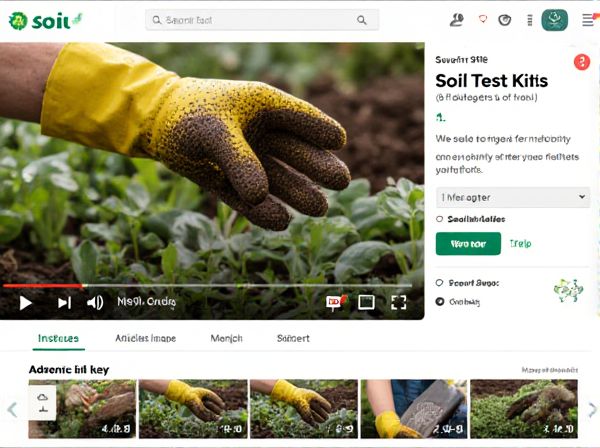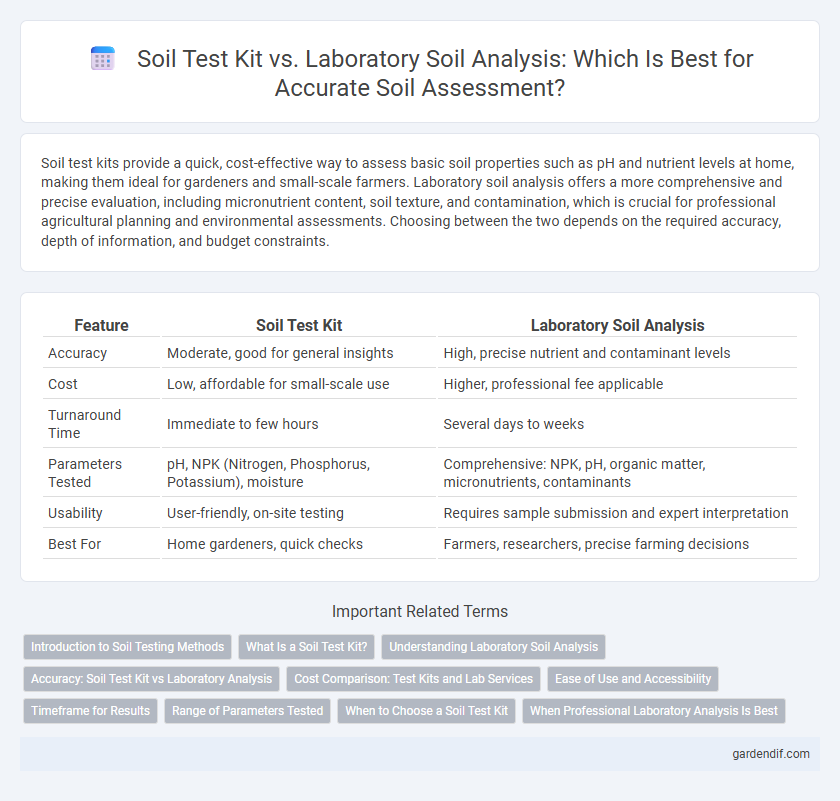
Soil test kit vs Laboratory soil analysis Illustration
Soil test kits provide a quick, cost-effective way to assess basic soil properties such as pH and nutrient levels at home, making them ideal for gardeners and small-scale farmers. Laboratory soil analysis offers a more comprehensive and precise evaluation, including micronutrient content, soil texture, and contamination, which is crucial for professional agricultural planning and environmental assessments. Choosing between the two depends on the required accuracy, depth of information, and budget constraints.
Table of Comparison
| Feature | Soil Test Kit | Laboratory Soil Analysis |
|---|---|---|
| Accuracy | Moderate, good for general insights | High, precise nutrient and contaminant levels |
| Cost | Low, affordable for small-scale use | Higher, professional fee applicable |
| Turnaround Time | Immediate to few hours | Several days to weeks |
| Parameters Tested | pH, NPK (Nitrogen, Phosphorus, Potassium), moisture | Comprehensive: NPK, pH, organic matter, micronutrients, contaminants |
| Usability | User-friendly, on-site testing | Requires sample submission and expert interpretation |
| Best For | Home gardeners, quick checks | Farmers, researchers, precise farming decisions |
Introduction to Soil Testing Methods
Soil test kits provide quick, on-site assessment of key soil parameters such as pH, nutrient levels, and moisture, enabling immediate decision-making for gardeners and farmers. Laboratory soil analysis offers a comprehensive and precise evaluation of soil composition, including micronutrients, organic matter, and contaminants, using advanced instrumentation and standardized protocols. Combining rapid field tests with detailed lab analysis optimizes soil management practices and enhances crop productivity.
What Is a Soil Test Kit?
A soil test kit is a convenient, portable tool designed for farmers and gardeners to assess key soil parameters such as pH, nutrient levels (nitrogen, phosphorus, potassium), and moisture content directly in the field. Unlike laboratory soil analysis, which provides comprehensive and highly accurate data through advanced techniques like spectrometry and chromatography, soil test kits offer quick, preliminary results that guide immediate soil management decisions. These kits are ideal for routine monitoring but may lack the precision and detail necessary for diagnosing complex soil fertility issues or contaminant presence.
Understanding Laboratory Soil Analysis
Laboratory soil analysis provides a comprehensive evaluation of soil properties, including nutrient content, pH levels, texture, and organic matter through precise instrumentation and standardized procedures. Unlike soil test kits, which offer quick and basic results, lab analysis delivers detailed data essential for accurate soil fertility assessment and tailored agricultural recommendations. This in-depth understanding helps optimize crop yield, soil health, and sustainable land management practices.
Accuracy: Soil Test Kit vs Laboratory Analysis
Soil test kits offer quick and cost-effective preliminary nutrient assessments but often lack the precision and comprehensive analysis provided by laboratory soil testing. Laboratory soil analysis employs advanced instrumentation to measure nutrient concentrations, pH levels, and organic matter with high accuracy, minimizing errors common in field kits. Accurate soil data from labs enable precise fertilization and soil management decisions, crucial for optimizing crop yield and environmental sustainability.
Cost Comparison: Test Kits and Lab Services
Soil test kits offer a cost-effective solution for basic nutrient and pH analysis, typically ranging from $10 to $50, making them ideal for home gardeners and small-scale farmers. Laboratory soil analysis provides comprehensive and precise results, with prices varying from $50 to $150 or more depending on test complexity and location. While test kits save initial costs, lab services deliver detailed data essential for large-scale agriculture and professional soil management, justifying the higher investment.
Ease of Use and Accessibility
Soil test kits offer a user-friendly and easily accessible option for gardeners and farmers, allowing immediate on-site analysis without requiring technical expertise. Laboratory soil analysis provides comprehensive and highly accurate results but involves sample collection, shipping, and longer waiting periods. The convenience of soil test kits suits quick assessments, while laboratories excel in delivering detailed data essential for precise soil management.
Timeframe for Results
Soil test kits provide rapid, on-site results within minutes to hours, enabling immediate decision-making for gardeners and farmers. Laboratory soil analysis typically requires several days to weeks as samples undergo detailed chemical and biological testing, delivering more comprehensive and accurate data. Choosing between the two depends on the urgency of results and the need for precision in soil nutrient and contaminant assessments.
Range of Parameters Tested
Soil test kits typically measure basic parameters such as pH, nitrogen, phosphorus, and potassium levels, providing quick and accessible results for general gardening needs. Laboratory soil analysis offers a comprehensive range of tests, including micronutrients, organic matter content, cation exchange capacity, and contaminants, ensuring precise and detailed insights into soil health. The broader spectrum of parameters covered by laboratories supports advanced soil management and targeted agricultural practices.
When to Choose a Soil Test Kit
A soil test kit is ideal for gardeners or farmers needing quick, on-site results for pH, nutrient levels, and moisture without the delay of lab processing. Choose a soil test kit when routine monitoring or immediate decisions about fertilization and soil amendments are required, especially in small-scale or home gardening scenarios. Laboratory soil analysis is better for comprehensive testing, including micronutrient profiling and contamination assessment, when precision and detailed recommendations are critical.
When Professional Laboratory Analysis Is Best
Professional laboratory soil analysis is best when precise nutrient levels, pH values, and contaminant detection are critical for high-stakes agricultural or environmental projects. Laboratory tests provide comprehensive data on soil composition, trace elements, and microbial activity that home soil test kits cannot accurately measure. For large-scale farming, remediation, or scientific research, relying on certified lab results ensures informed decision-making and optimal soil management.
Soil test kit vs Laboratory soil analysis Infographic

 gardendif.com
gardendif.com